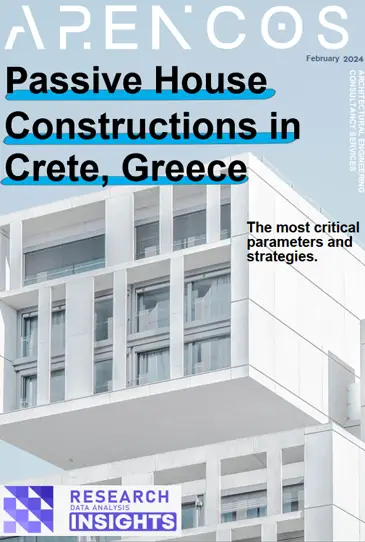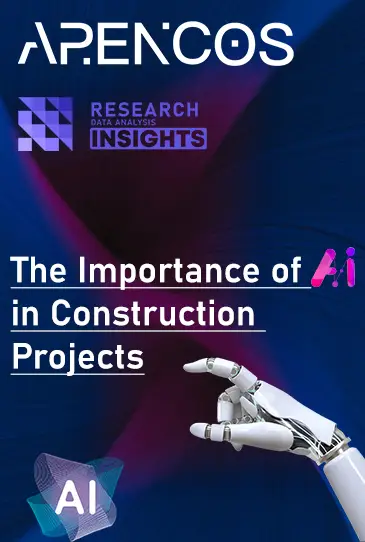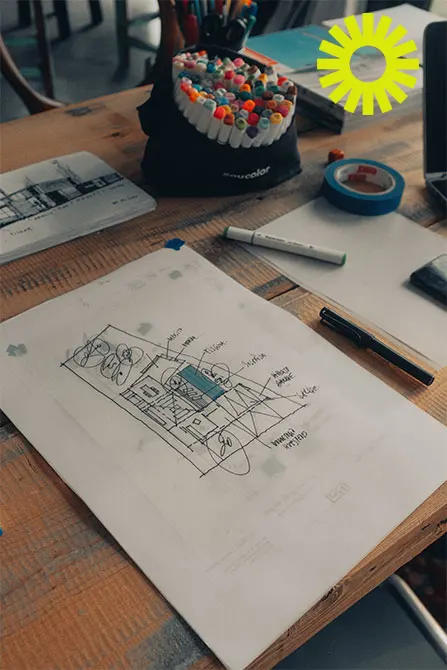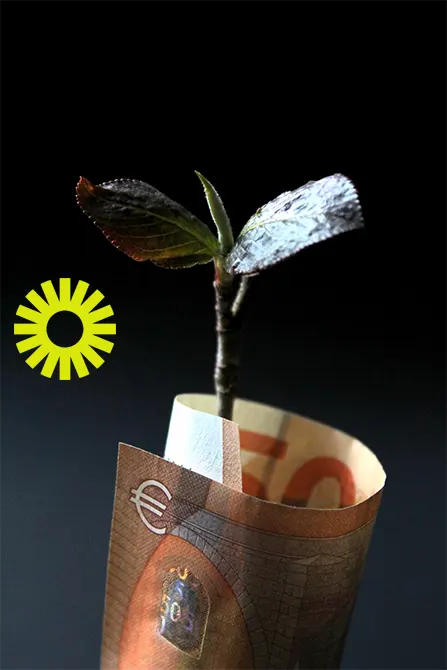Construction Activity in Crete. Key Trends and Prospects to 2022
The SimpleMind Series
Chania Construction Sector 2022

In Search of Exceptional
Impact of COVID-19 on the construction sector
The COVID-19 pandemic is definitely not just a short-term crisis. It has long-lasting consequences for how construction sector behaves and how supply chains function. Business continuity, safety and risk management in residential and commercial construction projects are very important to create a long-term business resilience for managing future challenges.
This requires knowledge sharing and value creation. Construction firms in Crete should consider developing an effective framework that includes a responsive and resilient risk management plan combined with fully integrated operational excellence strategies.
That synergy should be technology-led, leveraging platforms that support data analytics, artificial intelligence and machine learning. It should also ensure end-to-end transparency across the entire life-cycle of a construction project.
Construction Sector Facts & Trends For 2022 & Building Activity
According to the National Statistical Service of Greece, construction output in Greece rose 3.7 percent from a year earlier in the third quarter of 2021, easing from a 4-year high of 16.2 percent growth in the second quarter as low base effects begin to fade.
Building activity soared 27.0 percent (vs 25.4 percent in Q2), the highest reading since at least 2016. On the other hand, civil engineering works decreased by 9.5 percent (vs a 9.8 percent rise).
Many reports over the remaining part of the forecast period (2022-2025), indicate that the country’s construction sector should record an average growth rate of 2.6% between 2022 and 2025. The sector’s output will be supported by improving investor confidence and investments in transport, renewable energy, residential and commercial infrastructure projects.
The government is focusing on the development of massive renewable energy projects, in line with its target to increase the share of renewable energy in the total energy mix by 35% over the next 10 years. The plan involves a target of producing 7.7GW of solar PV and 7GW of onshore and offshore wind capacity by 2030.
An increase in building permits and foreign direct investment (FDI) in construction will also contribute to the industry’s growth momentum in the early part of the forecast period.
According to the ELSTAT, the number of building permits issued in the country registered growth of 36% in the first four months of 2021, increasing from 5,272 during January-April 2020 to 7,172 during January-April 2021.

Boom in Building Permissions

The Total Building Activity (private-public) in Greece, in September 2021 which is calculated on the basis of the number of issued building permits, amounted to 1,982.
This figure corresponds to 728.1 thousand m2 of surface and 3,118.9 thousand m3 of volume, reflecting, respectively, an 11.2% increase in the number of building permits, an 85.1% increase in surface, and an 102.3% increase in volume, compared with the corresponding month of 2020.
The building permits for the Private Building Activity issued in Greece in September 2021 amounted to 1,973. This figure corresponds to 709.1 thousand m2 of surface and 2,963.9 thousand m3 of volume. In comparison with the same month of 2020 there is an 11.5% increase in the number of building permits, an 82.2% increase in surface and a 95.5% increase in volume.
From October 2020 until September 2021, Total Building Activity (private-public) in Greece, calculated on the basis of the number of issued building permits, amounted to 22,596. This figure corresponds to 5,879.3 thousand m2 of surface and 24,529.5 thousand m3 of volume.
In comparison with the corresponding period from October 2019 until September 2020, there is a 17.7% increase in the number of building permits, a 42.5% increase in surface and a 39.3% increase in volume.
In the same period, from October 2020 until September 2021, Private Building Activity in Greece recorded a 17.7% increase in the number of issued building permits, a 40.7% increase in surface and a 35.8% increase in volume, compared with the corresponding period from October 2019 to September 2020.
Construction Market Data
During the period January – September 2021, Total Building Activity (private-public) in Greece recorded a 26.8% increase in the number of issued building permits, a 60.5% increase in surface and a 55.6% increase in volume, compared with the corresponding period of 2020.
During the same period, January – September 2021, Private Building Activity in Greece recorded a 26.9% increase in the number of issued building permits, a 59.2% increase in surface and a 52.5% increase in volume, in comparison with the period of January – September 2020.
The Construction Outlook For 2022 is Looking Positive, But the Sector Will Face Challenges
The construction sector in Crete responded well during the pandemic and has come out strong in the post-recession recovery period. Total construction spending recovered and seems that will peak a record high (approximately 8% higher than 2019 average levels signaling consistent expansion in construction projects and real estate investments in Crete.
In a recent survey conducted by our firm, 82% of the respondents characterized the outlook for their investment portfolio as somewhat or very positive, 33% higher than last year.
Driving this business confidence is the expected strong performance of both commercial and residential construction projects. Looking into the two segments in more detail, residential projects in Crete continued to stay strong despite the fact that construction materials have experienced significant rates of price increases and the spread of the coronavirus Delta variant.
The housing construction sector showed strong growth and also experienced noteworthy progress across both single – and multifamily new projects.
Purchase Of New Buildings in Greece Without Value-Added Tax
Greece suspends the VAT until 31.12.2022 for completed new buildings that have not yet been sold and for new buildings that are currently under construction.
Prospective buyers have the possibility to purchase new buildings without the particularly high VAT of 24% of the agreed purchase price and only have to pay the very low land transfer tax of 3% of the purchase price instead.
Time And Cost of Obtaining Building Permits and Licenses
According to our research, it requires 17 administrative procedures to construct a commercial project (considerably higher than the OECD high-income average of 12.7) and takes more than 200 days compared to the 152.3 OECD average.
The average cost of completing these bureaucracies is marginally above the OECD high-income average, as it represents 1.9% of the warehouse value compared to 1.5% for the OECD high-income average.
Ongoing Supply-Chain Issues to Constrain Construction Activity in Crete
Supply chain challenges and bottlenecks in building products and materials are taking longer than expected to normalize, limiting the construction sector’s ability to fully benefit from strong end-market demand and grow interest.
The disruption is causing significant production delays and supply shortages affecting key materials such as lumber, paint and coatings, aluminum, steel, and cement, among others. Transportation costs, particularly for shipping, are also increasing.
An additional impact is the increased costs. During the second and third quarter of 2021, the prices of important construction materials prices observed double-digit increases every month. For example, the producer price index (PPI) for steel products increased by more than 170%, copper by 55%, plastic construction products by 35%, and lumber and plywood by 18%—all year over year in September 2021.
Among other things, our latest research about the issues affecting the delivery of construction projects in Crete, including barriers to innovation and the efficient operation of supply chains, identifies that:
Research Outcomes
- Proactive change management should be taken seriously in the project planning and design phases of commercial and residential construction projects.
- In addition, contractors should be proactive in managing processes and operations. Artificial Intelligence, Big Data and Business Analytics can help managers. suppliers, material management and contractors make better-informed decisions and develop alternate sourcing strategies to ensure minimum impact on projects.
- Construction firms in Crete should collect and analyze their project data where possible to support their decision-making and improve cost efficiency.
- Furthermore, the integration of digital technologies into construction projects could significantly improve the overall process and establish high rates of success.
Optimizing supply chain management through robust governance and risk management practices is significantly important for the construction sector. Going through this strategically designed process helps to shift the focus from just in case to just in time and provides the opportunity to ensure that the supply chain planning is resilient
Outlook
The construction sector in Crete, Greece has made a significant recovery from a recession in 2021, but it has also experienced several significant headwinds that are expected to persist in 2022. Labor deficiencies and supply chain disruptions have hit the sector hard, leading to project delays, increasing costs, and further investment problems.
Simultaneously, business digitalization continues to make its way into the sector, making it important for engineering and construction firms to focus on developing data and analytics as a core competency. In the years to come, foreign demand will likely continue to be the main driver of the residential and commercial construction sector in Crete, while the revival of the domestic market will be determined by Greece’s ability to achieve sustainable growth that will create job opportunism and increase incomes.
The evolution of the residential real estate market in Greece is tightly linked with the demand for tourism-related investments. Moreover, the recovery of the tourism sector will lead to further growth in housing prices and rental demand.
How can ARENCOS help?
We’re here to assist our clients not only to design and develop their next project in Crete – no matter the size or purpose- but also provide dedicated services and tools to create responsive, adaptable and intelligent solutions that will build resilience for their commercial or residential projects.
Do you need help?
We're committed to creating spaces that matter.
transformation. sustainability. total architecture. technology. earth materials. knowledge sharing. creativity. innovation.

ARENCOS PHILOSOPHY
How we Think
At ARENCOS we view architectural design and construction engineering as a holistic process of exploration and discovery fueled by limitless thinking.
ARENCOS
Values Commitment
While our business continuously evolves, our core values are remaining constant. They define our way of working and are at the heart of everything we do in the field of architectural and engineering immersive experiences.
creativity/ innovation/ transparency
Digital Ecosystem
Our Businesses
We innovate on a continual basis, following trends and customer needs in the sectors in which we operate. We deliver essential innovations across our businesses— Construction & Civil Engineering, Real Estate, and Property Management.









